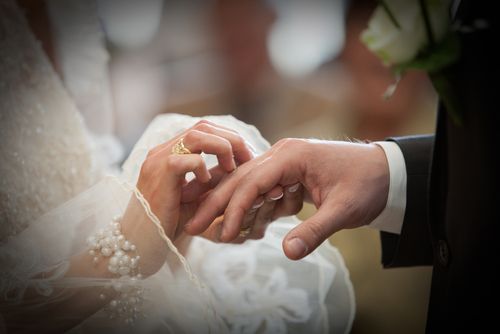 Like other events, wedding ceremonies require a plan for successful execution. A ceremony script includes an order of service, rites, and accompanying language. Every wedding is unique, especially those including religious traditions. Before choosing or writing your Christian marriage ceremony script, you should know the basic wedding script format. Whether you're officiating or planning a wedding, this knowledge can help you tailor a Christian wedding script that meets your needs.
Like other events, wedding ceremonies require a plan for successful execution. A ceremony script includes an order of service, rites, and accompanying language. Every wedding is unique, especially those including religious traditions. Before choosing or writing your Christian marriage ceremony script, you should know the basic wedding script format. Whether you're officiating or planning a wedding, this knowledge can help you tailor a Christian wedding script that meets your needs.
What Does a Christian Wedding Script Contain?
A wide variety of wedding traditions exists within Christianity. Many denominations have specific rules regarding ceremonial ritual elements and wording. However, most Christian marriage ceremony scripts contain a few fundamental components:
- Introduction
- Prayers and Readings
- Declaration of Intent
- Vow and Ring Exchange
- Pronouncement
- Closing Statement
Additional elements depend on the denomination or the couple's preferences. You can check out our example Christian wedding officiant script for more details.
What's in the Introduction, Prayers, and Readings?
Depending on the script's language, the first portion may be labeled the "Introduction" or "Invocation." The officiant usually offers thanks to God, acknowledges the guests' presence, and explains the ceremony's purpose. The officiant may also describe marriage as a sacred bond witnessed by God and the community.
Prayers and readings typically follow the introduction. These often include material from existing liturgical sources. Alternatively, the officiant may write a prayer for this section. Besides scripture and liturgy, text readings can also come from poetry, fiction or nonfiction prose, song lyrics, movie quotes, or even traditional sources. Keep in mind that the ceremony can include two readings: one from the officiant and another from a friend or family member of the couple.
What Should Be in the Declaration of Intent?
The Declaration of Intent is a critical part of any wedding script. In this section, the couple confirms that they're entering into the marriage contract of their own free will.
No specific language is required. Most scripts typically include phrases like, "Do you take this person as your spouse to love, honor, and cherish?" If you need inspiration, check out our other sample wedding scripts.
The vow and ring exchange comes right after the Declaration of Intent. The vows can incorporate traditional wording or borrow from liturgical texts. Alternatively, the couple could write their own vows or include simplified modern language like our simple ceremony script During the ring exchange, the accompanying language can speak about the rings' symbolism.
Is the Pronouncement Required for a Wedding Script?
Any wedding ceremony must include a pronouncement for the marriage to be legally binding. The officiant must say something like this: "By the power vested in me by the state of Ohio, I now pronounce you legally married." Minor variations in this phrasing are acceptable, such as "I pronounce you husband and husband."
Additional language in a wedding ceremony script Christian pronouncement can vary. The officiant can include personal sentiments and add wording such as, "You may now share a kiss."
How Does a Wedding Ceremony End?
A simple Christian wedding ceremony script can end with a closing statement or benediction. The officiant may close with a prayer, scripture, personal remarks, or a combination of the three. Many officiants include well-wishes to the couple in this section — ideal for ending the ceremony on a positive note.
Thanks for reading our Christian marriage ceremony script guide! You can refer to this FAQ as you're writing the script for your next nuptial celebration. If you find yourself struggling with words, check out our helpful resources. You can try our wedding script generator to produce a complete script in just a few easy steps. Officiants may also want to review our wedding training section and state marriage laws guide for additional info.